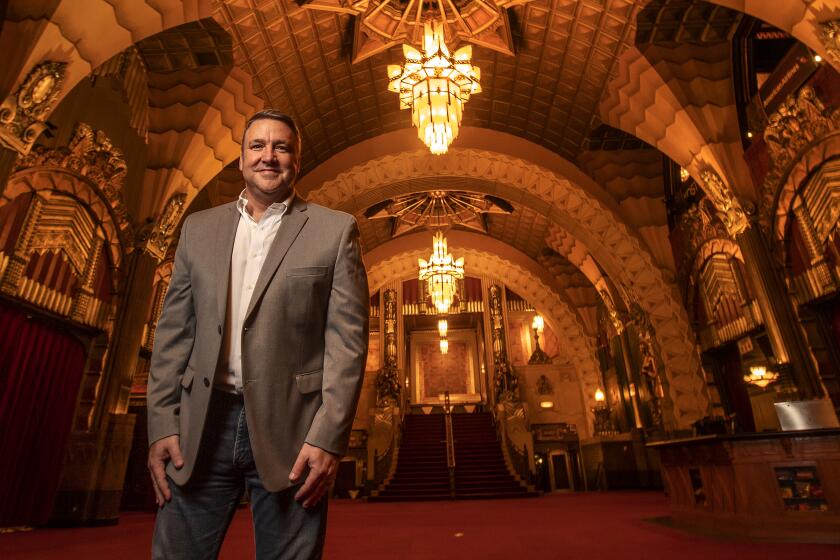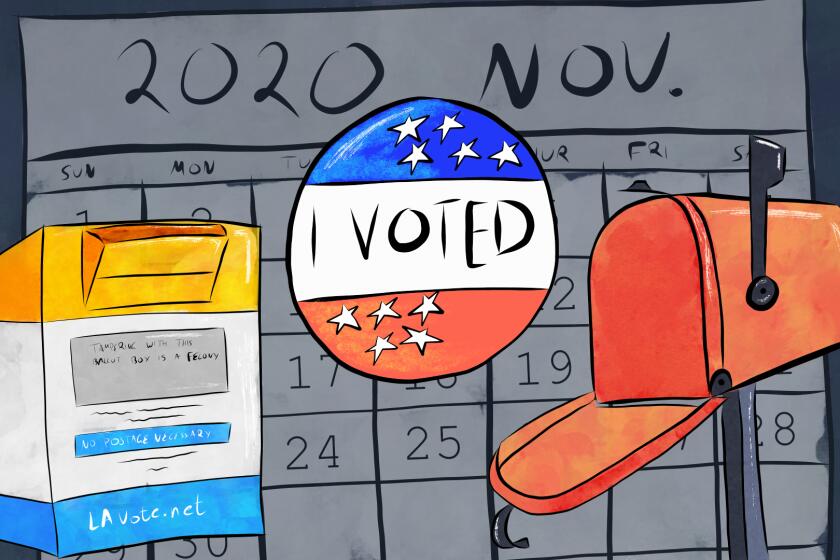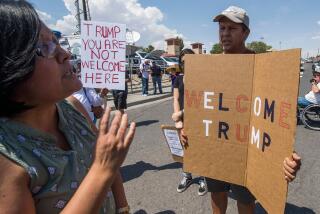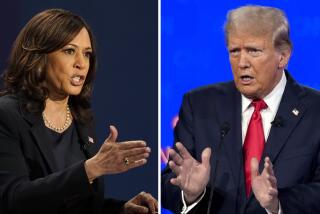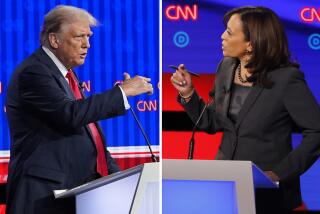Column: I wish we had a national mute button
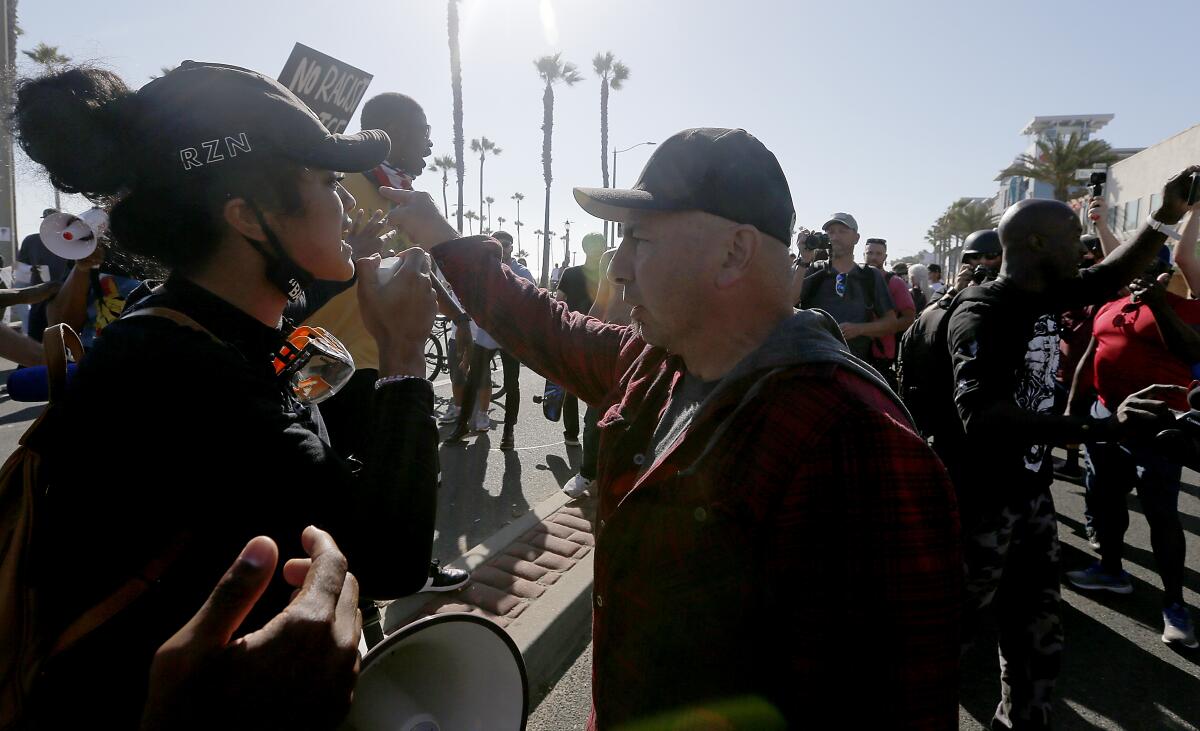
I wish we had a national mute button to help us better listen to one another.
Not just for the final presidential debate, which the ability to mute improved, but also for the other crucial debates we need to have as a country but can’t — until we stop shouting over and drowning out and dismissing one another.
I wish we could mute what we don’t have in common long enough to concentrate on what we do. Surely so many of us, after all, feel daunted by the breadth and depth of our country’s challenges.
An epidemic that has killed more than 223,000 of us. Great need that grows rapidly greater.
An enormous and entrenched imbalance of wealth and power. A too long, too often lethal record of racism and discrimination, of meting out justice as well as opportunity unequally. Ever more frequent and dangerous fires, hurricanes and windstorms.
Grave problems that all require concerted, collective commitment to confront. Problems that if we can agree on ways to tackle together will make us a far stronger nation.
But instead of finding opportunities to come together on what matters the most, we constantly face off as separate tribes across a vast no man’s land — fighting over the words we use and the symbols and slogans we choose, fighting even over our disparate processing of what should be objective reality.
We don’t hear one another’s views because we don’t watch or read the same news. We absorb and amplify only that which confirms our own set of beliefs.
The fact that, because he was muted when it wasn’t his turn to talk, President Trump couldn’t just talk over everything Joe Biden said helped clarify more substantive differences between them — if anyone still needs such clarification. But I think it also brought into the starkest relief their different capacities for compassion and empathy. Trump did not express either.
Not when asked about the enormous COVID death toll. Not when asked about children who had been separated from their parents at the border and now may never be reunited with them.
It’s my view that empathy often comes from really seeing and hearing and listening to people.
In more than 30 years of reporting, I’ve spent much more time listening than talking — including to people whose life experiences are very different from mine. Usually, the deeper I get to go below the surface, the more I discover the familiar. We share a common range of human emotions. We share fears for our futures — for our jobs, for our health, for our families, for our cities and towns and security. It’s often our interpretation of what it is that threatens us that sends us along divergent paths.
But what chance do most of us have to get in long discussions with people who do not think the way we do? We see glimpses of them on TV, we hear sound bites — but that is not the same thing. It’s so easy to reduce the sum total of strangers we don’t know to what we read on their T-shirts and caps. To assume, for instance, that the people we see chanting loudly at the president’s crowded rallies represent all those who support him and not just the most extreme.
The more we do that, the further apart we grow, the less likely we are to try to find common ground at the rare moments when we have the opportunity.
L.A. County offers a variety of unusual polling places for the 2020 election. Before I cast my vote, I’m considering all of the options.
I don’t support our current president for so many reasons. I don’t support his policies, foreign or domestic. I am so tired of his constant lies. I cringe at his ugly, race-baiting rhetoric and at his over-the-top denial of it. I don’t like the way he trashes anyone and everyone who dares to criticize him or stand up to him. I don’t like his assumption that our whole government should be in the service of his personal ambitions.
I especially don’t like the way he revels in driving wedges between us, in pushing us to belittle those who are different from us, to hate rather than hear one another out. I don’t like the way his own dismissiveness of so many of us has seemed to rub off on our nation. So much so that it’s often hard for reporters to go deep with his most ardent supporters because he has made them mistrust us too much to talk to us by labeling all the work we do “fake news.”
At the same time, I don’t believe that those who will vote for him are a monolith, accepting of all the worst things he says. I think a lot of people who because of him aren’t looking at the best available information remain under the impression that he’s a successful businessman who knows how to put more money in their pockets. I think a lot of people who are following his lead and so aren’t following what the real experts say have bought into his false message that it is politics alone, not their safety, that stands in the way of their returning to their pre-pandemic lives.
We should have a national leader who puts our collective safety first, who reminds us that we’re an “us,” not an “us versus them,” that as Americans we need to join forces to get through this terrible time. That we should all hold in our hearts the pain of the many thousands of our fellow Americans whose lives have been devastated in recent months and do everything in our power to help control the pandemic to limit how many thousands more have to suffer. That so much of what we’re struggling through crosses all divisions and party lines.
Our current president does exactly the opposite.
But even without him, we have long been too quick to choose sides — based on how we look, how we dress, how we talk.
It is all here. How to vote. Where to vote. Endorsements. What issues are on the ballot in California and Los Angeles County.
In the pandemic, choosing sides over masks has become life threatening. But we can’t even agree on that.
We’re not accepting the same studies. We’re not agreeing on a set of facts.
And we fritter away so much time not agreeing, not listening, not hearing, not even trying to get past our differences and find overlap. Just fuming and sputtering at the mere sight of one another.
Have you ever been on a jury and found yourself surrounded by people from very different backgrounds, some with very different views of the world? Somehow you have to find a way to listen and hear one another out, to come together, to agree on the case put before you.
I wish we had more opportunities in life to sit down with and work side by side with people who are not like us — to come together calmly to grapple over problems, to talk them through and examine them from multiple perspectives.
I wish we had a national mute button so that, at least once in a while, we could tune out the noise and the static, the screaming and the shouting, and better hear one another think.
More to Read
Sign up for Essential California
The most important California stories and recommendations in your inbox every morning.
You may occasionally receive promotional content from the Los Angeles Times.
